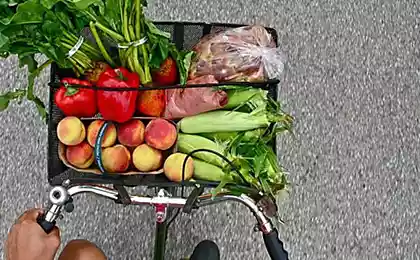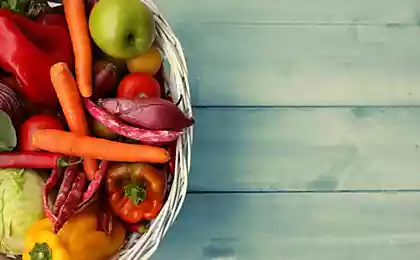455
Useful tips on child nutrition in the country
Strawberry, strawberries, raspberry
Strawberries, wild strawberries, raspberries are extremely rich in vitamin C, fiber and contain a lot of sugars. However, parents should know that these berries have a strong allergenic effect, so introduce them into your baby's diet can be no earlier than 9-10 months and give it to children with extreme caution, keenly watching the reaction to the berries.
Cucumbers
Cucumber — just like water, 95% of this vegetable out of it and is. And it dissolved a significant quantity of minerals and b vitamins in cucumbers Also contains special enzymes that promote the assimilation of proteins of animal origin. It is therefore very useful to combine cucumber salad with meat dishes.
From 6 months baby can be given pomusolit a small piece of fresh cucumber (by the way, it is convenient to scratch the teeth).
Tomatoes
Tomatoes contain little fiber, but have high content of iron, potassium, vitamin C and vitamin A, necessary for the development of the baby.
The juice from fresh tomatoes children may have to give 5-6 months and 8-9 months — add in a vegetable puree of fresh tomatoes, pre-clearing them from the skin.
Carrots
This vegetable is the richest source of provitamin A (beta-carotene, which strengthens the immune system, protects cell structure, enhances the overall resistance to stress). Also carrots are rich in vitamin C, potassium and iron.
4-5 months children are given carrot juice, and then add itself to the carrots in the vegetable puree. Please note: to achieve maximum absorption of beta-carotene, carrot puree, it is desirable to give with vegetable oil or sour cream.
Beets
In addition to excellent composition (the product is rich in organic acids, potassium, magnesium, calcium and iron, it has a lot of fiber and carbohydrates), beetroot increases hemoglobin level, normalizes metabolism, strengthens the cardiovascular system and helps to improve digestion. In General, strongly useful not only for children but also for adults.
But due to the high content of pigments beet dishes should be very careful to introduce in children's diet no earlier than 9-10 months. Allergic reactions to this product are extremely rare, and it's better to be safe.
Potatoes
New potatoes is a valuable source of b vitamins, as well as R and C (these vitamins are very necessary for a growing organism), while, due to the content of slow carbohydrates are digested and absorbed, respectively, slowly, prolonging the feeling of satiety.
To the child's body was ready to digest such a difficult vegetable, it is better to enter from 6-7 months in the form of light mashed potatoes. Curiously, the longer you cook the potatoes, so it becomes easier to digest, but, unfortunately, during heat treatment by boiling in 30 minutes, the potatoes lose more than 75% of vitamin C.
Greens
In parsley, dill, chives, sorrel, celery and garlic contain substances that have antimicrobial properties.
Already 8-9 months the greens can and should be added to baby food.
Be careful with the addition of sorrel: it consists of a lot of oxalic acid which can adversely affect metabolism, and often is allowed not earlier than in 2 years of age.
Cabbage
We must know that raw cabbage has a blowing effect, and during heat treatment, this effect is less pronounced, so in small amounts in mixtures with other vegetables it can be given to children from 7-9 months. This kind of cabbage contains a lot of calcium and protein, b vitamins and normalizes the digestive system.
Well, sauerkraut retains the vitamin C and since 1-1,5 years can be introduced to children's diet.
Zucchini
Zucchini is easy to digest, it is low in calories, with a lot of different trace elements (iron, copper, phosphorus, potassium, magnesium and sodium), while, thanks to him, improves the function of the gastrointestinal tract and the immune system. Besides, it has a high content of vitamins C and B.
It is important for parents to know what baby food this vegetable is suitable, because maaalenkoe. As a rule, children begin to enter as one of the first lures in the form of puree for approximately 4-5 months.
Eggplant
Eggplants are low in calories and contain small amounts of carbohydrates that can be attributed to this product to diet. By eating eggplant, it is provided good kidneys, digestive and cardiovascular system.
However, this product contains a poisonous substance — solanine (in large amounts affects the nervous system). A lot of the solanine is located in overripe fruit, so it is better not to eat.
Nutritionists and pediatricians recommend introducing eggplant to the food the child is 3 years of age. For a child choose a slightly nedopetye fruit. They have few seeds and very thin skin.
Apples
These fruits contain a lot of sugars, pectin, iron, vitamin C and malic acid. Malic acid increases the secretion of digestive juices, improves the motor function of the intestines and speeds digestion. In addition, it has a beneficial effect on the metabolism of fats and reduces cholesterol in the blood.
Puree and Apple juice is traditionally considered to be the first lure. Child 5-6 months can be given to chew a piece of Apple, of course, pre-peeled.
Useful tips on child nutrition in the country
Source: www.gastronom.ru
Strawberries, wild strawberries, raspberries are extremely rich in vitamin C, fiber and contain a lot of sugars. However, parents should know that these berries have a strong allergenic effect, so introduce them into your baby's diet can be no earlier than 9-10 months and give it to children with extreme caution, keenly watching the reaction to the berries.
Cucumbers
Cucumber — just like water, 95% of this vegetable out of it and is. And it dissolved a significant quantity of minerals and b vitamins in cucumbers Also contains special enzymes that promote the assimilation of proteins of animal origin. It is therefore very useful to combine cucumber salad with meat dishes.
From 6 months baby can be given pomusolit a small piece of fresh cucumber (by the way, it is convenient to scratch the teeth).
Tomatoes
Tomatoes contain little fiber, but have high content of iron, potassium, vitamin C and vitamin A, necessary for the development of the baby.
The juice from fresh tomatoes children may have to give 5-6 months and 8-9 months — add in a vegetable puree of fresh tomatoes, pre-clearing them from the skin.
Carrots
This vegetable is the richest source of provitamin A (beta-carotene, which strengthens the immune system, protects cell structure, enhances the overall resistance to stress). Also carrots are rich in vitamin C, potassium and iron.
4-5 months children are given carrot juice, and then add itself to the carrots in the vegetable puree. Please note: to achieve maximum absorption of beta-carotene, carrot puree, it is desirable to give with vegetable oil or sour cream.
Beets
In addition to excellent composition (the product is rich in organic acids, potassium, magnesium, calcium and iron, it has a lot of fiber and carbohydrates), beetroot increases hemoglobin level, normalizes metabolism, strengthens the cardiovascular system and helps to improve digestion. In General, strongly useful not only for children but also for adults.
But due to the high content of pigments beet dishes should be very careful to introduce in children's diet no earlier than 9-10 months. Allergic reactions to this product are extremely rare, and it's better to be safe.
Potatoes
New potatoes is a valuable source of b vitamins, as well as R and C (these vitamins are very necessary for a growing organism), while, due to the content of slow carbohydrates are digested and absorbed, respectively, slowly, prolonging the feeling of satiety.
To the child's body was ready to digest such a difficult vegetable, it is better to enter from 6-7 months in the form of light mashed potatoes. Curiously, the longer you cook the potatoes, so it becomes easier to digest, but, unfortunately, during heat treatment by boiling in 30 minutes, the potatoes lose more than 75% of vitamin C.
Greens
In parsley, dill, chives, sorrel, celery and garlic contain substances that have antimicrobial properties.
Already 8-9 months the greens can and should be added to baby food.
Be careful with the addition of sorrel: it consists of a lot of oxalic acid which can adversely affect metabolism, and often is allowed not earlier than in 2 years of age.
Cabbage
We must know that raw cabbage has a blowing effect, and during heat treatment, this effect is less pronounced, so in small amounts in mixtures with other vegetables it can be given to children from 7-9 months. This kind of cabbage contains a lot of calcium and protein, b vitamins and normalizes the digestive system.
Well, sauerkraut retains the vitamin C and since 1-1,5 years can be introduced to children's diet.
Zucchini
Zucchini is easy to digest, it is low in calories, with a lot of different trace elements (iron, copper, phosphorus, potassium, magnesium and sodium), while, thanks to him, improves the function of the gastrointestinal tract and the immune system. Besides, it has a high content of vitamins C and B.
It is important for parents to know what baby food this vegetable is suitable, because maaalenkoe. As a rule, children begin to enter as one of the first lures in the form of puree for approximately 4-5 months.
Eggplant
Eggplants are low in calories and contain small amounts of carbohydrates that can be attributed to this product to diet. By eating eggplant, it is provided good kidneys, digestive and cardiovascular system.
However, this product contains a poisonous substance — solanine (in large amounts affects the nervous system). A lot of the solanine is located in overripe fruit, so it is better not to eat.
Nutritionists and pediatricians recommend introducing eggplant to the food the child is 3 years of age. For a child choose a slightly nedopetye fruit. They have few seeds and very thin skin.
Apples
These fruits contain a lot of sugars, pectin, iron, vitamin C and malic acid. Malic acid increases the secretion of digestive juices, improves the motor function of the intestines and speeds digestion. In addition, it has a beneficial effect on the metabolism of fats and reduces cholesterol in the blood.
Puree and Apple juice is traditionally considered to be the first lure. Child 5-6 months can be given to chew a piece of Apple, of course, pre-peeled.
Useful tips on child nutrition in the country
- For proper growth and development of the child does not need a huge amount of vitamins and minerals and we often want to feed children vegetables and fruits "in reserve"), their excess may harm the health of the baby. Everything must be balanced and in moderation. Compared to other seasons, in summer the amount of vegetables, fruits and berries should grow by no more than 10-25%.
- Diet of fruits and vegetables for kids with allergies should be limited: they need to avoid brightly colored (red, orange) fruit and vegetables — they can trigger an allergic reaction. Moreover, children with allergies is not recommended excessive consumption of fruits and berries rich in fructose (dried fruit, bananas, figs, cantaloupe, sweet figs, grapes, persimmons, etc.).
- Kids, prone to being overweight and suffering from obesity should refrain from excessive consumption of potatoes.
- Even if you are feeding a child that was raised in the country, be sure to wash your food before eating. The temptation is to eat directly from the garden is great, but "their" is not a guarantee of sterility, because, for example, it is possible that the wind will bring from a nearby site to your spray there is a solution.
- There is a perception that well water can not boil, and give your baby raw. Even if it's a well for personal use, with a good "analysis of water" that is periodically purged, such water to drink only to adults. No one can guarantee the perfect purity of the water and the lack of possible infection, so for children well water is better to boil.
Source: www.gastronom.ru
Artificial intelligence and deep learning: robotic servants become a reality
Cars for hazardous waste in St. Petersburg























